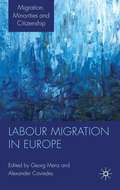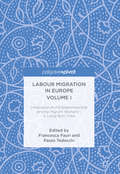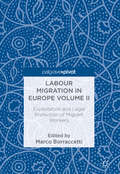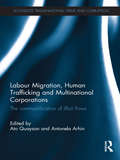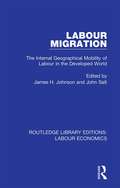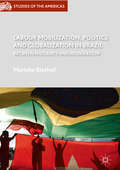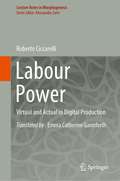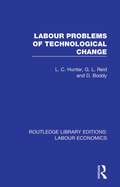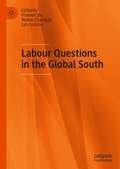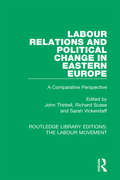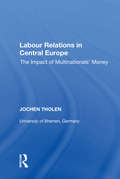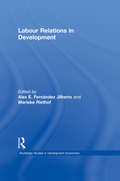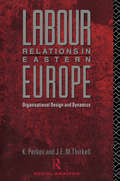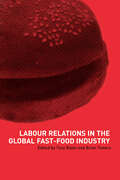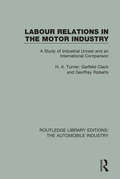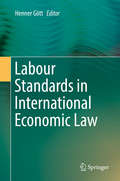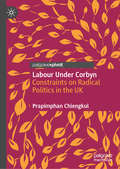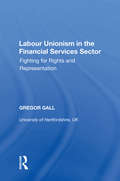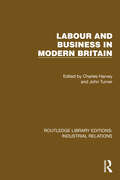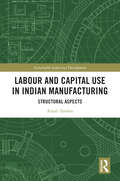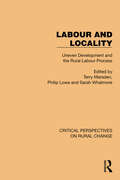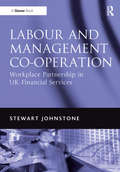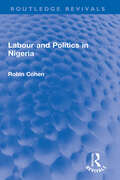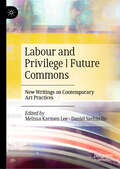- Table View
- List View
Labour Migration and Social Development in Contemporary China (Comparative Development and Policy in Asia)
by Rachel MurphySince the mid-1980s, mass migration from the countryside to urban areas has been one of the most dramatic and noticeable changes in China. Labour migration has not only exerted a profound impact on China’s economy; it has also had far-reaching consequences for its social development. This book examines labour migration in China, focusing on the social dimensions of this phenomenon, as well as on the economic aspects of the migration and development relationship. It provides in-depth coverage of pertinent topics which include the role of labour migration in poverty alleviation; the social costs of remittance and regional, gender and generational inequalities in their distribution; hukou reform and the inclusion of migrants in urban social security and medical insurance systems; the provision of schools for migrants’ children; the provision of sexual health services to migrants; the housing conditions of migrants; the mobilization of women workers’ social networks to improve labour protection; and the role of NGOs in providing social services for migrants. Throughout, it pays particular attention to policy implications, including the impact of the recent policy shift of the Chinese government, which has made social issues more central to national development policies, and has initiated policy reforms pertaining to migration.
Labour Migration in Europe
by Georg Menz Alexander CaviedesExamining the new realities of economic immigration to Europe, this book focuses on new trends and developments, including the rediscovery of economic migration, legalization measures, irregular migration, East-West flows, the role of business and employer associations, new positions amongst trade unions, and service sector liberalization.
Labour Migration in Europe Volume I: Integration and Entrepreneurship among Migrant Workers – A Long-Term View
by Francesca Fauri Paolo TedeschiIn this book, Fauri and Tedeschi bring together contributions that outline the movement of job seekers and ethnic minority entrepreneurs in Europe, to analyse the overall impact of different forms of migration on European economies in the last 100 years. Contributions address a broad range of themes, from the motivations of migrants and the process of their integration into their destination country, to their overall social and economic impact onto said country at a structural level. In addressing questions as to why some ethnic groups seem to compete more successfully in business, as well as addressing questions about how skilled labour can be attracted and retained, this volume forms part of a very important multidisciplinary dialogue on labour migration. The policy implications of answering such questions are also discussed, as contributors ultimately examine whether skills-dependent migration policy needs to form part of a common strategy, either at a national or an international level.
Labour Migration in Europe Volume II: Exploitation and Legal Protection of Migrant Workers
by Marco BorraccettiViolence, deception, fraud and abuse have always been commonplace occurrences for migrants, not only in their final country of destination but also in their countries of origin and countries of transit. In today’s world, the link between mobility and security issues is ever-increasing. Acknowledging this, how can we work to protect and improve migrants’ rights? Is the protection for migrants offered by the EU sufficient as-is, or is a more integrated approach that requires greater cooperation from migrants’ country of origin called for? What role can the private sector play in all of this? In this book, Borraccetti brings together contributions that analyse how migrant exploitation can be combatted. All essays focus on the protection and promotion of human rights and pay particular attention to the rights of children and other vulnerable people.
Labour Migration, Human Trafficking and Multinational Corporations: The Commodification of Illicit Flows (Routledge Transnational Crime and Corruption)
by Ato Quayson Antonela ArhinAlthough much literature on human trafficking focuses on sex trafficking, a great deal of human trafficking results from migrant workers, compelled - by economic deprivation in their home countries - to seek better life opportunities abroad, especially in agriculture, construction and domestic work. Such labour migration is sometimes legal and well managed, but sometimes not so – with migrant workers frequently threatened or coerced into entering debt bondage arrangements and ending up working in forced labour situations producing goods for illicit markets. This book fills a substantial gap in the existing literature given that labour trafficking is a much more subtle form of exploitation than sex trafficking. It discusses how far large multinational corporations are involved, whether intentionally or unintentionally, in human trafficking for the purposes of labour exploitation. They explore how far corporations are driven to seek cheap labour by the need to remain commercially competitive and examine how the problem often lies with corporations’ subcontractors, who are not as well controlled as they might be. The essays in the volume also outline and assess measures being taken by governments and international agencies to eradicate the problem.
Labour Migration: The Internal Geographical Mobility of Labour in the Developed World (Routledge Library Editions: Labour Economics #10)
by James H. Johnson John SaltFirst published in 1990. This edited work brings together a collection of studies, by an international team of contributors, on inter-urban migration, which is largely dominated by labour migration. The structure of the book reflects the interaction of the supply and demand of labour and the information flows that make this possible. The book offers a multi-dimensional analysis of labour migration, including behavioural, economic and institutional approaches. It combines various scales of analysis, including the national scale, the occupational scale and the household scale. The study also examines labour migration in a variety of national contexts. It will be of particular value to professional geographers, economists and sociologists with an interest in the distribution of population and the labour force, planners with responsibility for the development of policy and some final year graduate students.
Labour Mobilization, Politics and Globalization in Brazil: Between Militancy And Moderation (Studies of the Americas)
by Marieke RiethofThis book analyses the conflicts that emerged from the Brazilian labour movement’s active participation in a rapidly changing political environment, particularly in the context of the coming to power of a party with strong roots in the labour movement. While the close relations with the Workers' Party (PT) have shaped the labour movement’s political agenda, its trajectory cannot be understood solely with reference to that party’s electoral fortunes. Through a study of the political trajectory of the Brazilian labour movement over the last three decades, the author explores the conditions under which the labour movement has developed militant and moderate strategies.
Labour Power: Virtual and Actual in Digital Production (Lecture Notes in Morphogenesis)
by Roberto CiccarelliThis book offers a critical account of Karl Marx’s dazzling theory of labour power which is also one of the most influential concepts in the history of contemporary philosophy. Labour power is the dark side of the digital revolution. Working men and women are invisible and treated like human service, flesh and blood automatons or organic extensions of a machine that produces data on its own. Automation is viewed as something magic made possible by algorithms whose life is independent of human beings.Labour power, however, has not disappeared. Without drivers, Uber cannot connect customers on its platform; without searches on its browser, Google grinds to a halt; without us, Facebook or Instagram is desert. Labour power is the dwarf hidden inside the puppet of technology that allows algorithms to be intelligent and make the biggest profits in the history of capitalism.The invisible centrality of labour power is the political enigma of our times. Today a new account of the theory of labour power is needed more than ever in order to understand the political economy of digital capitalism on new grounds. Unlike a long tradition in the history of work, labour power is not only the work or the data it produces, but a potency that does not coincide with its current commodification. The actuality of labour power does not exhaust the virtuality that can be actualised by its faculty. Even when reduced to a commodity, labour power does not exhaust the potency of its being otherwise.Immersed in the constant propaganda that boosts the latest technological inventions, we neglect the fact that this wealth is produced by us and that it could be ours precisely because it is a part of our potential to be other than what we are at present. This book is a vibrant invitation to consider the fact that we are always connected with the potency that is constantly at work in our life. If this were not the case, we would not be alive. If we do not strive to become consciously and collectively active, we will never know.
Labour Problems of Technological Change (Routledge Library Editions: Labour Economics #8)
by L. C. Hunter G. L. Reid D. BoddyFirst published in 1970. This book is concerned with the examination and assessment of the impact of changes in technology on companies in three selected industries: printing, steel and chemicals. Its main focus is on the employment and associated labour market effects of technological change; but part of the rationale for the study as a whole has been to relate these effects to the technological environment of each industry. Accordingly, a good deal of attention has been paid to the character of the innovations themselves and to their implications for the industries in general terms. This title will be of interest to students of Business Studies and Economics.
Labour Questions in the Global South
by Praveen Jha Walter Chambati Lyn OssomeThis book provides a focus on some of the main markers and challenges that are at the core of the study of structural transformations in contemporary capitalism and their implications for labour in the Global South. It examines the diverse perspectives and regional and social variations that characterise labour relations as a result of the uneven development which is an important facet of the intensification of capitalist accumulation.. The book provides important insights into the impact of the crises of capitalism on the wellbeing of labour at different historical junctures. Some of the issues covered by it include the conditions of work, and the changing composition of laboring classes and/or working people. The chapters also throw light on the multiple trajectories in the development of labour relations and employment in the Global South, especially after the ascendancy and domination of neoliberal finance capitalism. Some of the major aspects considered by the essays include the decentering of production and development of global value systems, crisis of social reproduction, and the rising informalisation of work.
Labour Relations and Political Change in Eastern Europe: A Comparative Perspective (Routledge Library Editions: The Labour Movement #39)
by Stephen G. JonesFirst published in 1995. This volume offers a comparative perspective on labour relations and political change in eastern Europe within a common theoretical and empirical framework. Its coverage includes Bulgaria, and Czech and Slovak republics, Hungary, Poland, and Russia. Particular attention is given to the dynamics of changes in labour relations and privatisation, which are now critical to the more general process of political and economic transformation. This title will be of interest to scholars and students of politics, sociology and modern history.
Labour Relations in Central Europe: The Impact of Multinationals' Money (Contemporary Employment Relations Ser.)
by Jochen Tholen Ludovit Czíria Eike Hemmer Wieslawa Kozek Zdenka MansfeldováSince 1990, foreign direct investment (FDI) has quickened economic modernization in Central Europe. State of the art management techniques and cutting edge technology have been introduced in many cases. Labour Relations is an essential factor in the organization of labour and production. At the start of the process industrial relations were characterized by the conditions existing under the previous planned economies or - as with "greenfield" investments - had to be entirely reconfigured. In the case of investments by West European companies, this book reveals various emerging models of industrial relations but also a clear tendency towards company centralization. For the time being the European Works Council still plays a subordinate role despite its potential fundamental role as mediator between East and West. Empirically nine corporations from the metal/automotive industry, the chemical, energy and food processing industries (with their subsidiaries in Poland, Czech Republic and Slovakia) are considered.
Labour Relations in Development (Routledge Studies In Development Economics #Vol. 27)
by Marieke Riethof Alex E. Fernández JilbertoThis timely and well-written collection explores the impact of economic reforms in developing and transitional economies across the world. In a first of its kind, this book examines such issues as:* in-depth, cross-regional analysis of the pressures for global integration* labour costs and their determinants: crucial factors in the success of econo
Labour Relations in Eastern Europe: Organisational Design and Dynamics (Social Analysis)
by Krastya Petkov J E ThirkellChanges in labour relations in Eastern Europe arising from recent political events can only be understood against an explanation of the existing structures and mechanisms of labour relations. This full-length collaborative study - the first in its field - analyses these structures and mechanisms by focusing on the radical reforms undertaken in Bulgaria over the last decade. Using a wealth of case studies, it looks at the action processes within enterprises and at the processes of strategy formulation on a national level in Bulgaria, and compares them with those processses in other Eastern European countries such as Yugoslavia and Hungary.
Labour Relations in the Global Fast-Food Industry
by Tony Royle Brian TowersThe fast-food industry is one of the few industries that can be described as truly global, not least in terms of employment, which is estimated at around ten million people worldwide. This edited volume is the first of its kind, providing an analysis of labour relations in this significant industry focusing on multinational corporations and large national companies in ten countries: the USA, Canada, the UK, the Netherlands, Germany, Australia, New Zealand, Singapore, and Russia.The extent to which multinational enterprises impose or adapt their employment practices in differing national industrial relations systems is analysed, Results reveal that the global fast-food industry is typified by trade union exclusion, high labour turnover, unskilled work, paternalistic management regimes and work organization that allows little scope for developing workers' participation in decision-making, let alone advocating widely accepted concepts of social justice and workers' rights.
Labour Relations in the Motor Industry: A Study of Industrial Unrest and an International Comparison (Routledge Library Editions: The Automobile Industry)
by Geoffrey Roberts H. A. Turner Garfield ClackThis book, originally published in 1967, takes the automobile industry experience as a basis for a wider view of industrial relations, trends and developments of the 1950s and 60s. The study also analyses the emergence of new institutions and systems of labour-management relationships. It contains chapters on the effects of automotion and technical change, on the impact of fluctuations in the market for cars and on wage trends. There are detailed surveys of some of the biggest post-war disputes and especially of trade union organization, the shop steward system, the experience of individual firms, such as Austin, Ford and Fiat. There is also a comparative survey of labour relationships in other major car manufacturing countries such as the USA, Germany and Japan.
Labour Standards in International Economic Law
by Henner GöttThe book offers a comprehensive perspective on the highly topical issue of protecting and promoting labour standards in international economic law and the globalized economy. For the purpose of an in-depth analysis of both the specific and the fundamental aspects in this regard, it combines views from specialized academics of the legal and political sciences as well as experienced practitioners. The contributions to this book do not only reveal recurring obstacles but also point at best practices and potential for synergies, providing important guidance for future research and practice in international economic and labour law and policy.
Labour Under Corbyn: Constraints on Radical Politics in the UK
by Prapimphan ChiengkulThis book provides an accessible yet critical analysis of the Labour Party under the leadership of Jeremy Corbyn (2015-2020) in the context of the contemporary British political economy. It analyses structural constraints on left-wing politics and evaluates the transformative potential of Labour’s economic and social policies under Corbyn. Drawing from a neo-Marxist and neo-Gramscian framework, the book argues that the material, institutional and ideological conditions before 2015 opened political space for a left-wing Labour Party, although the dominant historical structures severely limited its chance of coming to power. In addition, the book argues that Labour under Corbyn should not be dismissed as ‘populist’, and that its policies aimed to redress structural economic problems, promote economic democracy and tackle contemporary challenges. The book also highlights the importance of adopting a long-term approach to counter-hegemonic political struggle so as not to shrink the space for progressive politics.
Labour Unionism in the Financial Services Sector: Fighting for Rights and Representation
by Gregor GallIn recent years, there has been an acute crisis of worker representation in the finance sector in Britain. Labour union and staff association membership and density has fallen, collective organisation has experienced dislocation and disorganisation and worker self-confidence has been sapped. Prior to this, there was a sense of an identifiable trajectory towards greater 'unionateness' by labour unions and staff associations, with the sector moving towards growing self-identification of employees as 'workers' and the use of traditional tools of collective bargaining such as threats of strikes and strikes themselves. This study documents and explains these changes in wider historical terms, providing invaluable reading for those interested in the future of both the labour movement and the finance sector.
Labour and Business in Modern Britain (Routledge Library Editions: Industrial Relations)
by John Turner Charles HarveyLabour and Business in Modern Britain (1989) examines the history of labour relations in British business using important empirical research. The study of ‘labour process’ and the dynamics of the labour market are key, and each chapter stands alone as an investigation of an important episode, an important industry, or an important theoretical question refracted through an historical problem.
Labour and Capital Use in Indian Manufacturing: Structural Aspects (Sustainable Industrial Development)
by Anjali TandonThis book strengthens our understanding of Indian manufacturing. It argues that structural transformation should be guided by the given factor endowments. The book undertakes detailed empirical scrutiny to provide inputs for guiding the future industrial policy in India. The book recognises the differential structure of organised and unorganised manufacturing with their distinguished response to the use of labour and capital. The analytical framework consists of an economy-wide approach and structural relationships at the industry level. The underlying sectoral interdependence highlights the job creation potential of domestic manufacturing, which spreads into the non-manufacturing sectors through the essential accounting of the embodied effects. The impact of import utilisations underscores the leakages in the domestic economy in terms of the employment forgone and capital use, thereby highlighting the need to strengthen domestic production. The book clearly identifies the labour- and capital-intensive categories of manufacturing for empirical investigations. A comprehensive read on labour and capital use in Indian manufacturing, this book in the series Sustainable Industrial Development will appeal to scholars and researchers of economics, applied industrial economics, Indian economy, and business studies. It will also be of interest to professionals and practitioners in policy circles and research think tanks.
Labour and Locality: Uneven Development and the Rural Labour Process (Critical Perspectives on Rural Change #4)
by Sarah Whatmore Philip Lowe Terry MarsdenOriginally published in 1992, the volume shows through the lens of labour processes how global forces are played out at the local level. A range of important issues is addressed, including the commoditization and transformation of rural labour, and the role played by state policy in restructuring rural labour markets.
Labour and Management Co-operation: Workplace Partnership in UK Financial Services
by Stewart JohnstoneOver the last decade, the notion of labour-management cooperation and partnership has been central to debates around the future of employee representation. In this insightful analysis of the partnership process in the dynamic UK financial services sector, Stewart Johnstone focuses on the meaning of partnership, the processes involved, the different contexts in which events are played out, and on how we should assess the outcomes. Using detailed case studies, conducted in three diverse banking organisations, to understand more about the process, and employing the analytical 'efficiency, equity, voice' framework from the US that has never before been employed in a study of UK employment relations, Dr Johnstone presents a new way of evaluating the outcomes of a variety of partnership approaches. Labour and Management Co-operation provides a level of understanding that transcends the stalemate of recent times in which the advocates and critics of different approaches seem to have been locked. It will appeal to those with an interest in the current debate about 'voice and representation' and 'mutual gains' taking place amongst those involved with HRM and employee relations in Europe, the United States, and elsewhere.
Labour and Politics in Nigeria (Routledge Revivals)
by Robin CohenOriginally published in 1974 and with a new introduction for the 1981 edition, this book is a clear and vivid history of the role of organized labour in the politics of Nigeria. It covers the period from the first General Strike of 1945 to the civil war and reintegration of the country. As well as providing an analysis of the characteristics and attitudes of Nigeria’s wage earners, this study is concerned with their place in the wider political and social life of the country. The attempts of the trade unions to create a representative central labour organisation are considered, as is the internal structure of the unions themselves. The book also examines the relationship of the Unions with the political parties of the first Republic and later with the Military Government. The influence of the trade unions in the determination of wage rates is analysed. The book concludes with an overview of trade unions in other parts of Africa with which the performance and characteristics of organized labour in Nigeria are compared
Labour and Privilege | Future Commons: New Writings on Contemporary Art Practices
by Melissa Karmen Lee Daniel Szehin HoThis book project was part of an annual series of Summer seminars held at Hong Kong's Tai Kwun Centre for Heritage and Arts, which brought the intellectual community together to debate the social issues of the day. The artists, writers, and scholars included in these texts represent unconventional thinkers completing rigorous scholarship that we think is important to be published today, as Hong Kong seeks for social and political alternatives. This book will be of interest to public intellectuals, political/cultural theorists and thinkers, as well as the international art community.

